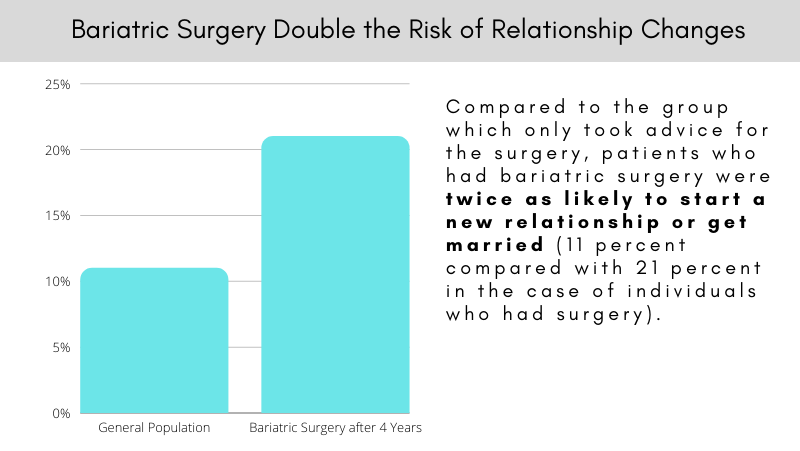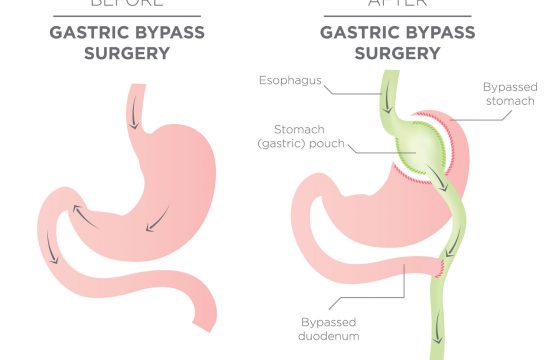
Bariatric surgery can become a necessity for some people. Especially if obesity results in severe health concerns, weight loss surgery is highly recommended. At the same time, it can help in achieving weight goals and a healthy lifestyle.
People who undergo bariatric surgery expect a positive change in their lives. The same is not just limited to a slimmer shape but also higher confidence, increased energy, active hobbies, a new wardrobe, and a healthier lifestyle. Research conducted in Sweden showed that in addition to the above, patients can also experience a change of heart post-surgery. What does this mean?
In March 2018, a study published in the JAMA Surgery found that post-bariatric surgery, people have an increased chance of changing their relationship status. So, people losing weight as a result of bariatric surgery are more susceptible to getting a divorce, separating from their partner, getting married, or starting a new relationship, compared to people who do not undergo the procedure.
According to the same research, the probability of experiencing a shift in the relationship status is directly proportional to the amount of weight lost. So, the higher the weight loss, the more the chances of such changes.
According to previous research, bariatric surgery improves the overall life of an individual based on different markers like sociability, quality, and health. The study in Sweden analyzes the impact of the bariatric procedure on wilting or budding romantic relationships.
Of course, when an individual changes physically, they can have mental stimulation like enhanced confidence or higher self-esteem. Yet, what affects relationships post weight-loss surgery?

Diving Deeper in the Current Study on Bariatric Surgery and Relationships
Two large Swedish national databases were used to draw data for the March 2018 study. One database compares the people who only received advice regarding weight loss surgery to a similarly obese group of people who had the surgery. The second database compares changes in the marital status of post-surgery individuals. The control group in the second database would be the general population, i.e. people of all sizes and shapes.
The author of this study is a Ph.D. and senior lecturer at Sweden’s University of Gothenburg. Per-Anne Svensson, says that the research team was most surprised by the high rate of patients who found partners after four years of undergoing bariatric surgery.

Compared to the group which only took advice for the surgery, patients who had bariatric surgery were twice as likely to start a new relationship or get married (11 percent compared with 21 percent in the case of individuals who had surgery).
According to Luke M. Funk, these higher percentages align with the situations bariatric surgeons observe in the clinic. Funk is the coauthor of invited commentary for the study (though he was not involved in the study). He also serves as the director of minimally invasive surgery at the University of Wisconsin School of Medicine and Public Health.
Quality of life significantly improves when individuals lose weight. Additionally, the patients bid goodbye to health conditions arising from obesity, like GERD (acid reflux), obstructive sleep apnea, diabetes, and high blood pressure. A boost in self-confidence and self-esteem is apparent as the person starts feeling better about himself or herself. Feeling more active and energetic than before also contributes to boosting confidence. People become more comfortable in going out as their self-image, energy and overall quality of life improves. As people go out more, they also have better chances at finding love according to Luke.
The coin has a flip side too. After the surgery, a higher percentage of patients decided to end their marriages or relationships. The authors conclude a 28 percent higher risk of separation or divorce from your partner after four years of surgery. The figure is calculated after considering and accounting for other factors which are likely to influence separation or breakups.
According to the researchers, the speculation is such that the splits can be due to new habits or lifestyle changes post-surgery. After bariatric surgery, an individual must commit to a set diet and lifestyle. At the same time, the researchers caution against viewing these relationship changes as negative outcomes of the surgery.
The authors note that it is possible that the effects of weight loss can cause patients to leave unhealthy relationships post-bariatric surgery. These effects can be – improved self-image and self-confidence, empowering the person to seek healthier relationship goals.
Although the results from this study suggest that bariatric surgery can highly impact the dynamics in a relationship, the design of the study was such that it does not identify which partner chose to end the relationship. The study also does not identify the reasons for the change in these relationship dynamics.
Individuals who choose to undergo a significant change in their life such as bariatric surgery may have a ‘bias to action.’ This means that once they make a momentous life change, it can lead to additional life changes. The other changes can be as simple as changing their job to something significant and scary like moving to another place altogether. Svensson states that it might be a possible reason but is unlikely, according to the findings of his team. He says this because the outcomes of studies on both populations yielded similar results. It makes Svensson confident that loss in weight after surgery and the effects associated with it are the main driving factor for the results. He says that a potential bias in the design of the study is unlikely to yield the results.
Do you wish to undergo bariatric surgery? What can you learn from this study?
Although the results of the study reflect that the surgery can lead to an end in your relationship, Svensson advises potential patients to not lead too much into the risk. A dysfunctional relationship is not a result of bariatric surgery. He says that previous studies also show strengthening or no change in relationships post weight-loss surgery of one partner. The new study also supports the same. Herein, most of the individuals who had bariatric surgery continued their relationship even years after the surgical procedure.
According to Funk, people who undergo the surgery can experience new qualities which might be beneficial in maintaining the current relationship or starting a new one. People usually have chronic health conditions, low levels of energy, and depressions before surgery. Post-surgery, patients tend to become completely different. They’re healthier, more active, and also happier with the positive changes in their lives. According to Funk, patients socialize better after the surgery. The study must be noted for a positive outcome instead of a negative risk. Bariatric surgery has tremendously positive outcomes according to Funk.











